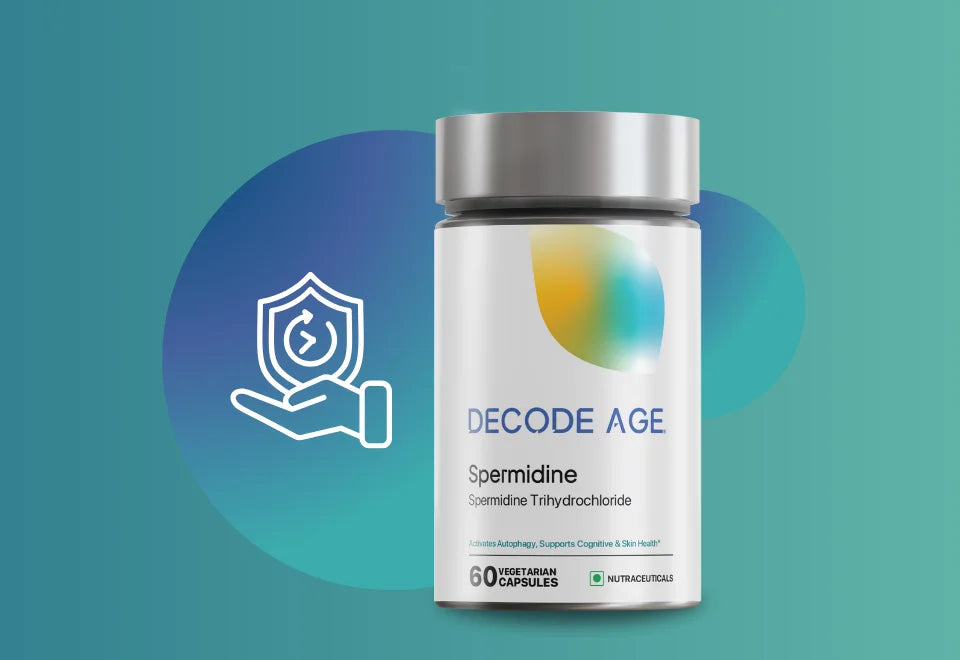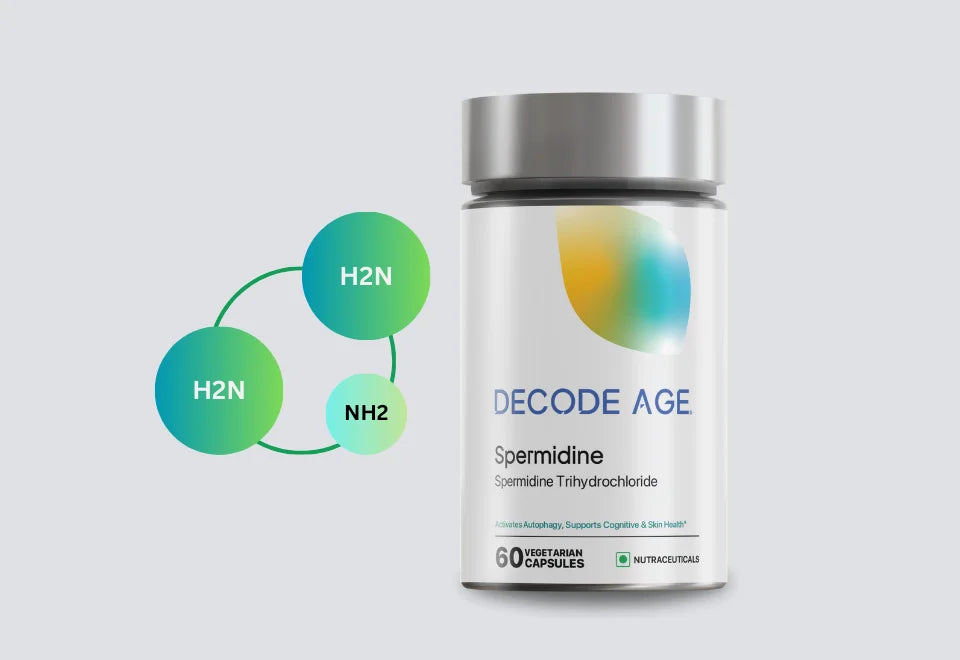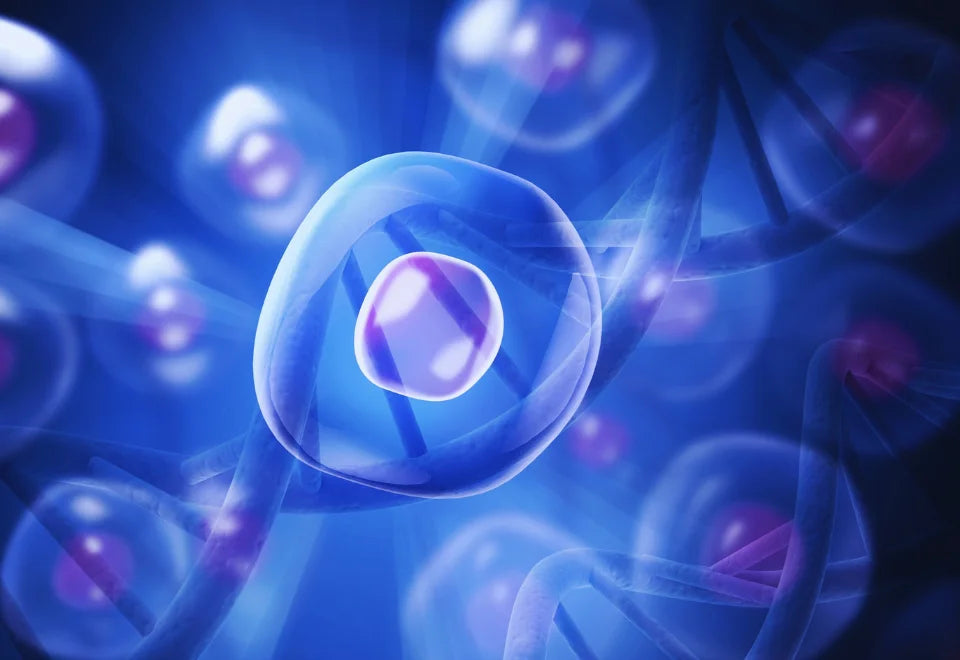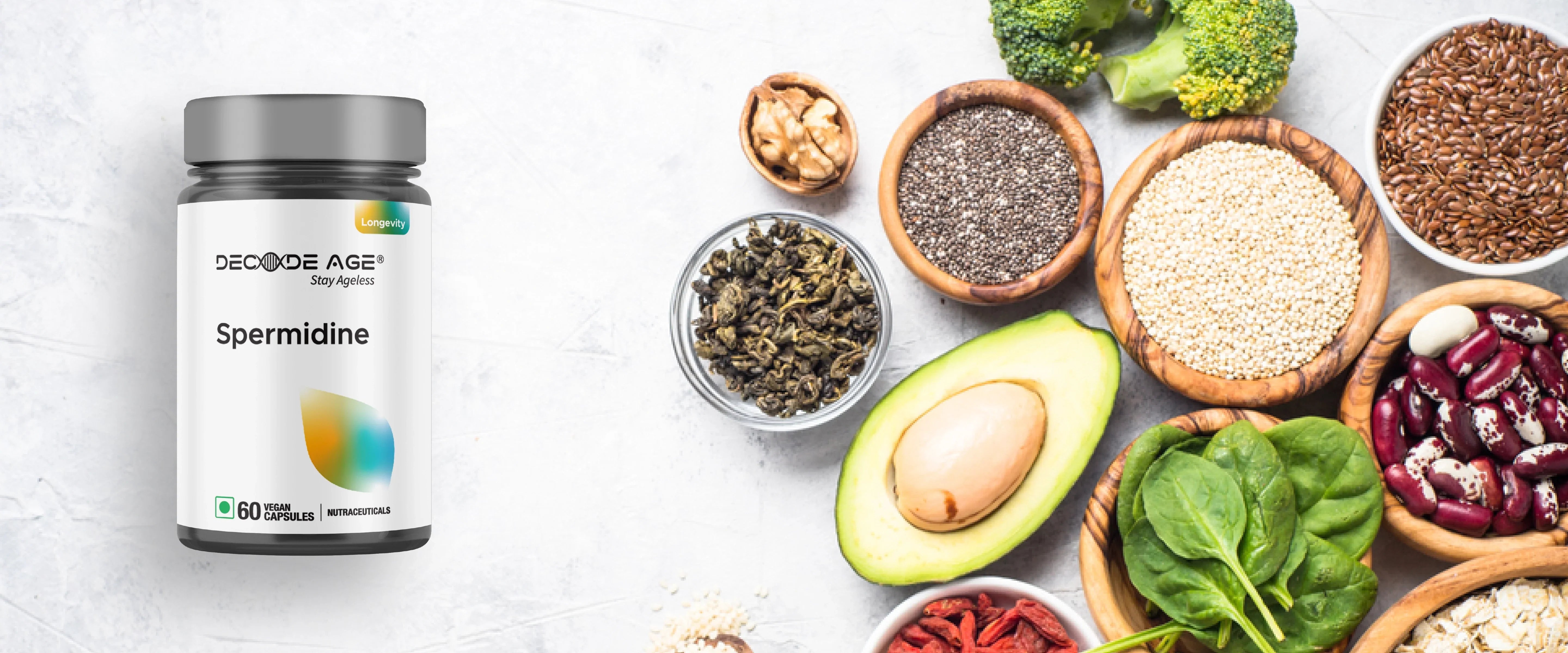Spermidine supplementation is being recognised as a potential strategy for reversing grey hair by enhancing melanin production, the pigment that gives hair its colour. The process of hair greying is attributed to a reduction in melanin by melanocytes, the cells in hair follicles. The hair growth cycle, which includes the growth (anagen), transitional (catagen), and resting (telogen) phases, is integral to hair health. Specifically, in the anagen phase, hair grows from the base of the hair bulb, where a decrease in melanin production can lead to grey strands. Spermidine aids in rejuvenating melanocytes, the cells that produce melanin, thereby potentially restoring hair's natural colour by stimulating melanin synthesis.
What causes grey hair?
Grey hair results from reduced melanin production by melanocytes in hair follicles. Melanin comes in two types: eumelanin (black and brown colours) and pheomelanin (red and blonde hues). With ageing, a decline in melanocyte function leads to reduced melanin production. Various mechanisms, including oxidative stress, genetic predisposition, hormonal changes, and degenerative alterations within the hair follicle, contribute to this decline. Premature greying can also occur due to factors such as genetics, autoimmune diseases, atopic diathesis, and premature ageing disorders like progeria. The causes are described below.
Intrinsic Factors
Intrinsic factors, such as age, genetics, and health conditions, are individual-related and influence various aspects of hair health. A few are given below
|
Factor |
Description |
|
Genetics |
Genetic predisposition and ethnicity can influence early greying. Age-related changes in genes reduce melanocytes, leading to grey hair. |
|
Nutrient Deficiencies |
Deficiencies in calcium, copper, zinc, vitamin B12, iron, folate, and selenium disrupt melanin synthesis, affecting hair colour. |
|
Oxidative Stress |
Increased ROS from melanin production causes oxidative stress. The lack of antioxidants in follicles contributes to greying. |
|
Medical Conditions |
Conditions like vitiligo and certain genetic disorders affect melanocyte function or pigment synthesis, causing grey hair. |
|
Stress |
Stress-induced norepinephrine release depletes melanocyte stem cells in follicles, affecting hair pigmentation. |
Extrinsic Factors
These factors include environmental risks like UV radiation causing oxidative stress, smoking-induced damage to melanocytes, and chemical exposure from hair dye and styling tools, all contributing to premature greying.
|
Factor |
Description |
|
Environmental Risk Factors |
UV radiation induces oxidative stress, harming melanocytes and disrupting melanin production, accelerating grey hair. Superoxide radicals generated exacerbate the process (Seiberg, 2013). |
|
Smoking |
Tobacco smoke chemicals prompt oxidative stress, damaging melanocytes responsible for hair pigment production, significantly correlating with premature greying (Zayed et al., 2013). |
|
Chemicals and Heat Styling Tools |
Hair dye chemicals, like hydrogen peroxide, decrease melanin levels, contributing to premature greying. Excessive use of bleaching products and heat styling tools also damages hair, leading to dullness and premature greying. |
Preventing and Reversing of Grey Hair
Reversing or preventing grey hair is a gradual process that involves making lifestyle modifications. This includes eating foods rich in antioxidants and addressing any nutritional shortfalls through diet changes or supplementation. Using supplements like spermidine to encourage melanin production may also aid in preserving or regaining your hair's natural colour.
Adopting Healthy Habits
Making small changes in your lifestyle, such as improving your diet, stopping smoking, and ensuring you're getting vital nutrients, can contribute to grey hair prevention. Some strategies include:
- Eating Foods High in Antioxidants
Including foods loaded with antioxidants like fruits, veggies, green tea, olive oil, and fish in your diet can help fend off grey hair. These foods combat oxidative stress from free radicals, which is a significant factor in early greying.
- Correcting Nutritional Deficiencies
To avoid grey hair, it's important to fill in any nutritional gaps. Consuming Vitamin B12 found in seafood, eggs, and meat can enhance melanin levels. Vitamin D, found in milk, salmon, and cheese, is beneficial for hair health. Insufficient copper can lead to reduced melanin and early greying while lacking zinc might affect melanin production and cause premature greying. Iron supplements may help prevent hair loss, and selenium protects against oxidative stress and sun damage. Folic acid is key for healthy hair growth.
- Quitting Smoking
Stopping smoking can decrease the intake of harmful chemicals and free radicals, reducing oxidative stress in the body. This helps maintain the function of melanocytes and prevents early hair pigment loss. Quitting smoking also boosts overall health.
- Managing Stress
Although the direct link between stress and sudden greying is still debated, managing stress through meditation, yoga, and physical activities might help in maintaining melanocyte activity and warding off early greying. Focusing on relaxation and adopting healthy habits are essential for keeping your hair looking young and vibrant.
How does Spermidine reverse Grey Hair
Spermidine (SPD), recognized as a naturally occurring polyamine with benefits for longevity, has demonstrated promising results in stimulating melanin synthesis within melanocytes, according to dose-dependent studies. Investigations involving human primary melanocytes and MNT-1 melanoma cell lines have shown that treatment with SPD can significantly elevate melanin content in both young and older melanocytes. These findings suggest that spermidine's capacity to boost melanin production is not limited by age, offering significant potential in the management and treatment of greying hair. This underlines the importance of spermidine as a potent ingredient in anti-grey hair strategies, highlighting its role in maintaining natural hair colour and possibly reversing the greying process. (Brito et al., 2022)
Spermidine has shown promising effects in prolonging the anagen phase, or the active growth phase, of hair follicles in humans. This extension means that a larger number of hair follicles remain in the growth phase for an extended period, promoting hair growth and density. In a rigorously designed study, participants who took spermidine supplements for 90 days exhibited a notable increase in the count of hair follicles in the active growth phase, in stark contrast to those who received a placebo.
The placebo group, which received a substance mimicking the spermidine supplement without any active ingredients, did not demonstrate any significant change in the number of hair follicles in the growth phase. This difference proves the positive impact on hair follicle growth can be attributed directly to spermidine supplementation, rather than to the placebo effect or other unrelated variables. (Rinaldi et al., 2017).
In another study, scientists explored how spermidine influences human hair follicles stem cells in laboratory settings. This research reinforced earlier observations that spermidine increases the number of hair follicles. It also highlighted spermidine's capacity to enhance proteins like K15 and K19- linked to hair stem cells, potentially boosting hair growth. Overall, this research suggests that spermidine might significantly benefit the health and function of hair follicles, offering hope for promoting human hair growth. (Ramot et al., 2011).
Conclusion
Spermidine appears to hold potential in counteracting grey hair through mechanisms such as boosting melanin production and extending the hair's growth phase. It tackles both intrinsic factors, like nutrient deficiencies, and extrinsic factors, such as oxidative stress and environmental influences, which are known to contribute to the greying process. As more research is conducted, spermidine supplementation could emerge as an effective strategy for not only reverting hair to its natural colour but also for enhancing hair growth and health, offering a comprehensive approach to hair health and rejuvenation.
FAQs
Is spermidine good for your hair?
Spermidine boosts hair growth by extending the active phase of hair follicles and shielding hair cells from oxidative stress and inflammation. Yet, further research is required to comprehend its complete impact on hair growth and health.
How do I stop my premature hair from greying?
To prevent premature greying, focus on a balanced diet packed with essential vitamins and minerals such as spermidine, B vitamins, iron, and zinc. Incorporate stress-relief practices like meditation or yoga. Avoid smoking and excessive alcohol. Be gentle with your hair, opting for mild products and reducing heat styling. For tailored guidance and potential treatments, consult a dermatologist.
What deficiency causes grey hair?
Certain nutrient deficiencies like vitamin B12, iron, copper, and zinc play a role in premature greying, although they are not direct causes. However, a balanced diet rich in these nutrients can promote overall hair health and potentially postpone the onset of grey hair.
Do spermidine supplements work?
Yes, spermidine supplements like Decode Age Spermidine promote autophagy, the cellular process that removes damaged components, potentially slowing down premature hair ageing and age-related decline. However, more research is needed to fully understand the effectiveness and safety of spermidine supplements in humans.
What are the benefits of Decode Age spermidine?
The Decode Age spermidine supplement offers various benefits, such as promoting cellular renewal, enhancing autophagy, improving skin health, boosting immune function, and potentially reversing grey hair. While spermidine's role in cellular processes may contribute to these effects, scientific evidence specifically supporting its ability to reverse grey hair is limited. Before considering spermidine supplements for specific health concerns, consulting healthcare professionals and conducting thorough research is essential.

























Leave a comment
All comments are moderated before being published.
This site is protected by hCaptcha and the hCaptcha Privacy Policy and Terms of Service apply.